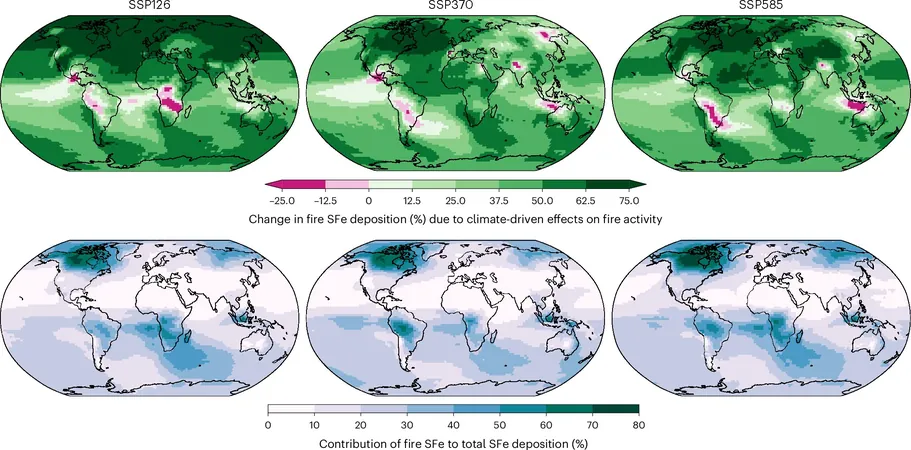
Forest Fires Ignite Ocean Changes: The Surprising Link to Climate Change
2025-06-13
Author: Noah
Unmasking the Hidden Impact of Forest Fires
Forest fires have always been a powerful force in shaping our planet, affecting everything from human health to biodiversity. Yet, their lesser-known impact on our oceans could be just as transformative.
How Fires Affect Oceanic CO₂ Absorption
When fires rage, they emit particles and essential nutrients into the atmosphere, which eventually find their way into ocean waters. This nutrient deposition can supercharge phytoplankton growth, the microscopic heroes of our oceans that play a crucial role in absorbing CO₂ from the air. The phenomenon mirrors fertilizing agricultural fields to boost crop production, significantly influencing Earth's carbon cycle.
Revolutionary Study Reveals New Insights
A groundbreaking study led by scientists from the Barcelona Supercomputing Center and ICREA, published in *Nature Climate Change*, has unveiled alarming predictions linking climate change, forest fires, and marine ecosystems. Researchers anticipate a dramatic rise in fires, particularly in boreal regions, leading to more iron emissions and increased nutrient supply to the oceans. This could significantly enhance phytoplankton productivity.
"Climate-driven fires are growing due to favorable conditions like low humidity and high temperatures, consequences of human-induced climate change. Grasping their impact on vital ocean regions such as the North Atlantic is essential for predicting future atmospheric CO₂ levels," states Carlos Pérez García-Pando, a co-leader of the research.
Boosting Marine Productivity: A Double-Edged Sword
Utilizing advanced climate models, the study projects that iron emissions from fires could soar by 1.7 to 1.8 times current estimates, resulting in a potential 40% increase in marine productivity during summer months by the century's end. This surge in phytoplankton could redefine the marine food chain and enhance CO₂ absorption.
However, this silver lining comes with a caveat: projected declines in other vital nutrients, also due to climate change, may hinder the ocean's CO₂ absorption capabilities, possibly negating some benefits of increased iron.
Understanding a Critical Feedback Loop
"Understanding how fire increases nutrient supply to phytoplankton is key to predicting future atmospheric CO₂ levels," explains Elisa Bergas-Massó, lead author of the study. Recognizing this crucial feedback loop is vital in addressing the pressing issue of climate change.
A Call for Multidisciplinary Research
The study highlights the necessity for a multidisciplinary approach, integrating atmospheric science, oceanography, and climate policy. Improved observational methods and models will be essential in quantifying these complex interactions and their true impact on CO₂ absorption.
Maria Gonçalves Ageitos, another leading researcher, emphasizes the study's importance, stating, "Our findings are vital for refining carbon cycle projections and ocean health assessments, ultimately guiding better climate adaptation strategies."









 Brasil (PT)
Brasil (PT)
 Canada (EN)
Canada (EN)
 Chile (ES)
Chile (ES)
 Česko (CS)
Česko (CS)
 대한민국 (KO)
대한민국 (KO)
 España (ES)
España (ES)
 France (FR)
France (FR)
 Hong Kong (EN)
Hong Kong (EN)
 Italia (IT)
Italia (IT)
 日本 (JA)
日本 (JA)
 Magyarország (HU)
Magyarország (HU)
 Norge (NO)
Norge (NO)
 Polska (PL)
Polska (PL)
 Schweiz (DE)
Schweiz (DE)
 Singapore (EN)
Singapore (EN)
 Sverige (SV)
Sverige (SV)
 Suomi (FI)
Suomi (FI)
 Türkiye (TR)
Türkiye (TR)
 الإمارات العربية المتحدة (AR)
الإمارات العربية المتحدة (AR)